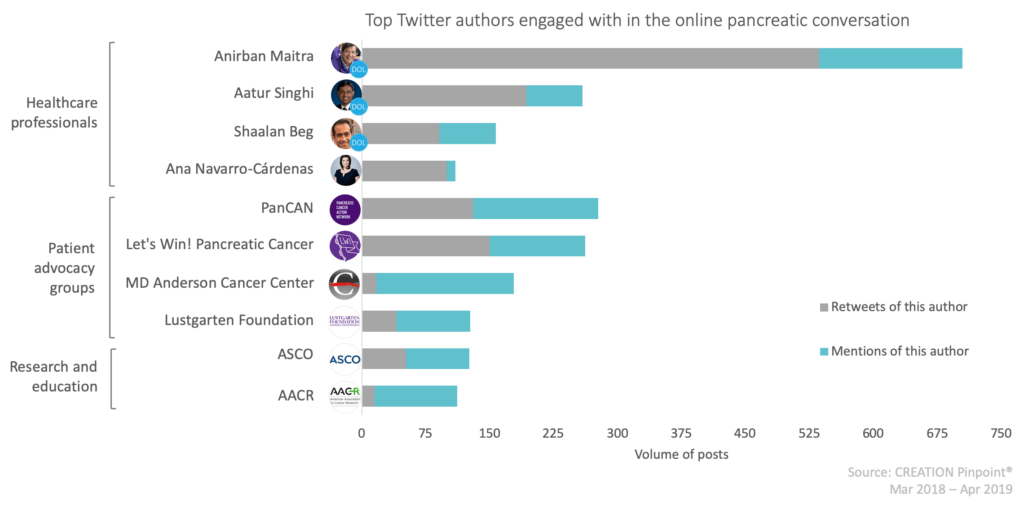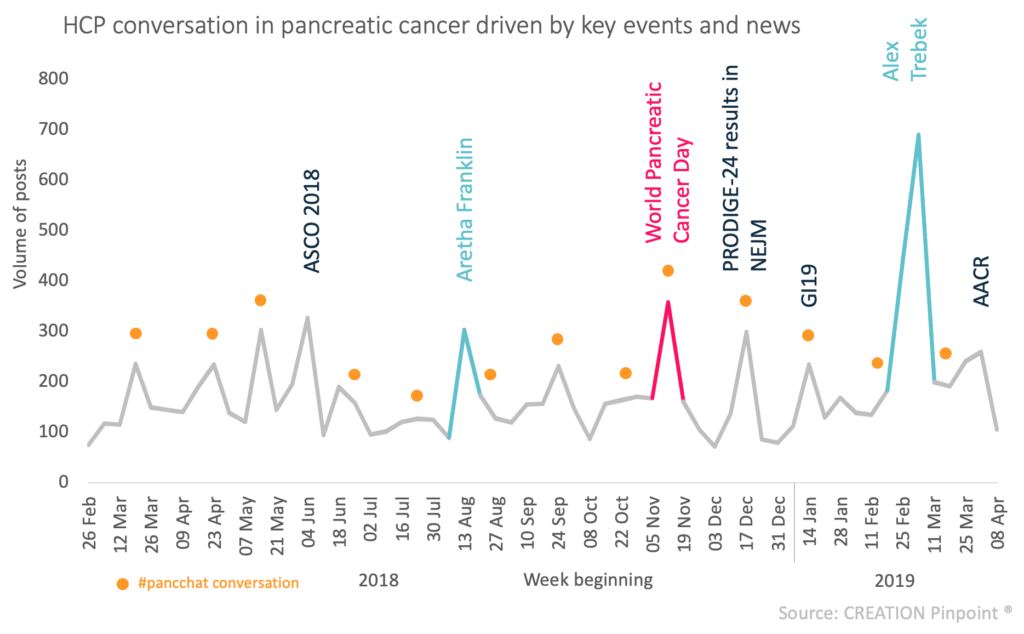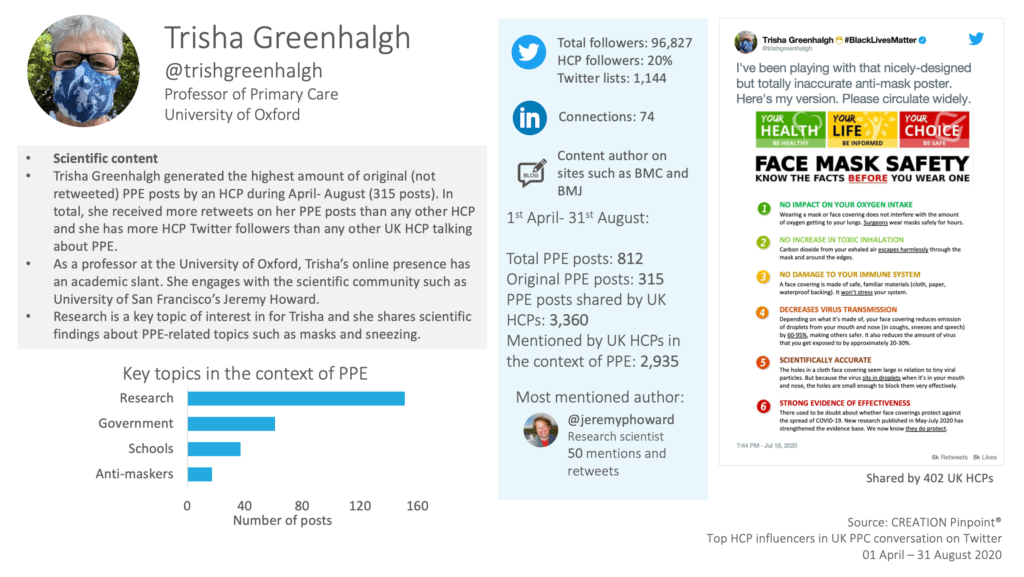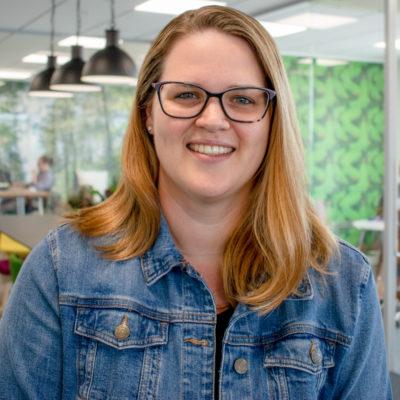The behaviours of healthcare professionals (HCPs) are changing and in the last 6 months, there has been a large increase in their use of social media. Many HCPs have been posting online at more than double their usual rate and pharmaceutical companies have been accelerating their digital plans and tactics by learning from their customers’ online conversations, according to research.
Building a meaningful brand as a pharmaceutical company can become quite overwhelming with multi-channel marketing and so many new opportunities, and challenges, to effectively engage with your HCP customers. But one thing has remained constant: the first and most important thing is to understand and listen to your customers!
The collective intelligence of HCPs on social media
Within any health topic discussed on social media, we have found that HCP mentions make up around 5% of the online conversation. The other 95% comes from patients, organisations, the media and members of the public. Distilling the conversation down to only posts from healthcare professionals presents a unique source of collective intelligence. Growing every day, there are millions of HCPs contributing billions of social media posts. Pre-COVID-19 we saw that the proportion of health-related conversations by HCPs was on the rise. After analysing the network of HCPs in the North East of England we saw that up to 50% of their posts were health-related posts, up from 10% in 2013. This is a behaviour that has only increased since the beginning of 2020.
We know that the thought of analysing the unprompted social media conversation of your HCP customers can be overwhelming and challenging but the first step is to just simply listen to them. You don’t have to start engaging or collaborating with them, just listen to their conversation and start to understand who they are, what needs they have, what do they think about different topics and what kind of support they would like and need.
Let’s take a look at some of the areas where understanding the online HCP conversation can reveal powerful insights and support your ongoing brand strategy and tactics.
Content planning
It may be relevant to discover what HCPs really feel about the products that you have in development. If you are a pharmaceutical product leader, it is likely that HCPs are shaping their perceptions of your product well before you have developed your brand plan.
We carried out a study into pancreatic cancer and saw HCPs talking about diagnosis and treatment of the disease. Since there are several long-awaited new treatments emerging, we saw a real passion among HCPs to understand data on new products, discuss it together, and consider what it means going forward.
Following negative results from the APACT trial, Shaalan Beg, a gastrointestinal oncologist, created a poll asking his peers “what will be your preferred option?”. 39 people responded which created an incredible learning resource for anyone else wanting to consider implications following the trial.
When thinking about content planning it is essential to speak the right message and use the language that your customers are using. When HCPs talk online, they often discuss the burden of disease and patient concerns as well as discussing efficacy, pricing and medicine administration. These conversations highlight customer needs that are likely to be specific to each role type and market.
Congress tactics
It can be valuable to follow the online conversations of HCPs prior to, during and after congress events to understand who or what is really influencing their views. Especially during this time where most of the medical congresses are held virtually. When we analysed what HCPs think about virtual congresses we found out the HCPs are showing excitement for the virtual adaption of the congress but they are missing seeing their colleagues and collaborating with them face-to-face. They are continuing to make the most of the congresses with live updates to support their peers and finding new ways to collaborate effectively online.
For example, the use of specific hashtags during this time is especially important for HCPs to quickly get to the content they are interested in. During the American Society of Clinical Oncology’s (ASCO2020) first virtual congress, gynecologic oncology professionals created a new hashtag. #goASCO20 brought together the specific ASCO 2020 gynecologic oncology conversations. It was the 10th most used cancer-type hashtag by HCPs in the online #ASCO20 conversation.
| Hashtag | Oncology Area | HCP posts |
|---|---|---|
| #lcsm | Lung cancer | 2,039 |
| #bcsm | Breast cancer | 1,157 |
| #gerionc | Geriatric oncology | 685 |
| #gyncsm | Gynecologic cancers | 464 |
| #bladdercancer | Bladder cancer | 422 |
| #breastcancer | Breast cancer | 422 |
| #mmsm | Multiple myeloma | 386 |
| #crcsm | Colon and colorectal cancer | 358 |
| #prostatecancer | Prostate cancer | 309 |
| #goasco20 | Gynecologic oncology | 301 |
By tracking the engagement of HCPs at congress meetings and listening to their conversations you can:
- Understand their views and interests.
- Monitor and learn from their digital behaviours.
- Identify their information needs and concerns about prescribing new products.
- Learn the language and messaging they are using.
- Gain competitive intelligence.
- Recognise strategic digital partnerships.
- Identify the influencers or Digital Opinion Leaders.
Partnerships
Our study of HCP conversations about pancreatic cancer showed that they were most engaged with their peers. Beyond other HCPs, however, patient advocacy groups (PAGs) were also highly engaged, with the top two being PanCAN and Let’s Win! Pancreatic Cancer. HCPs shared, mentioned and interacted with these groups, reflecting the trust that exists between them. The data suggests that manufacturers who successfully engage with these organisations in a meaningful way have the opportunity to reach HCPs too.

An example of successful digital engagement can be seen in Celgene’s initiative to launch a hashtag, #PancChat, together with patient advocacy group Let’s Win! Pancreatic Cancer’s co-founder Allyson Ocean, in 2016.
This hashtag brings together patients and HCPs in an online conversation to this day; the chart below illustrates how #PancChat has been a key driver of the online HCP conversation around pancreatic cancer. Each orange dot indicates a #PancChat discussion which HCPs use to engage with one another, patients and PAGs.

Digital Opinion Leaders
A fourth opportunity from the collective intelligence of HCP conversations online when you are brand planning is to think of the role of Digital Opinion Leaders (DOLs). These are the HCPs who are significantly influencing the conversation and views of their peers and the public online.
We might define a Digital Opinion Leader as anybody, or an organisation, who influences the view or behaviour of other stakeholders through digital activity. The opportunity for a pharmaceutical company is therefore to identify Digital Opinion Leaders who are having an influence upon these stakeholders.
When looking at influence metrics it is not simply about measuring who is talking the most. Metrics you might consider when identifying a DOL include: Do they post relevant content? Do they have a high peer or public following? Are they trusted among online HCP peers? Do they carry influence offline? Are they in an existing relationship with you?
In a recent collaboration with Frontline.Live, a charity working to address personal protective equipment (PPE) shortages in the UK, we analysed the conversations of healthcare workers on public social media to understand who is influencing the PPE narrative online.
Taking into account factors such as peer following and network integration, we identified the UK’s top three HCP Digital Opinion Leaders in the PPE conversation: professor and primary care physician Trish Grenhalgh; palliative care physician and author Rachel Clarke and cardiologist and MedShr CEO Asif Qasim. While each DOL presents a different online viewpoint, whether it be a focus on academic content, or stories political in nature, they are all using their online presence to raise awareness for PPE needs and promote better services for healthcare workers and patients.

Identifying and learning about the individual behaviours of your DOLs allows you to explore potential partnership opportunities. By listening to their online conversations and understanding their individual behaviours, you can leverage insights from the HCPs shaping the views on any topic, in any country.
What next?
We have covered content tactics, congress strategy, partnerships and identifying and activating digital opinion leaders. You know your HCP customers are online and that they are likely to be talking about your product and its competitors. These insights can inform your customer engagement, both online and offline.
Your next steps could look like:
- Discover which online networks your HCPs are talking on and plan channel-specific engagement.
- Discover the unmet needs of your HCPs and use this information to drive content creation.
- Discover the digital behaviours of your HCPs to plan your congress strategy early on.
- Discover which organisations or patient advocacy groups you have a vision alignment with that are already integrated into the HCP conversations.
- Discover who your digital opinion leaders are and build a relationship with them.
Following the application of these steps to your brand strategy, you can track the online response, learn how it shapes the behaviour of HCPs online and then use the learning to improve future campaigns.
 By Anni Neumann
By Anni Neumann 

